
Kaitlyn Finchler
Staff writer
Writing can be a magical form of communication, at least to Week Seven’s poet-in-residence Phillip Metres, especially since it can be used to connect two people without physical, spoken communication.
“Language is magic that connects us to not only ourselves and others, but also our ancestors and the spirit world,” he said.
Metres will deliver his Brown Bag lecture, “Poetry’s Magic: Talking with Ancestors, Summoning Spirits and Healing” at 12:15 p.m. today on the porch of the Literary Arts Center at Alumni Hall for Week Seven at the Chautauqua Writers’ Center.
“Although (magic) is only one of the jobs that poetry has done over the course of human history, it’s a very powerful one,” said Metres, an English professor and director of the Peace, Justice and Human Rights program at John Carroll University, as well as Core Faculty at the Vermont College of Fine Arts.
Metres’ work has garnered fellowships from the Guggenheim Foundation, the Lannan Foundation, the National Endowment for the Arts, the Ohio Arts Council and the Watson Foundation. Along with his forthcoming book, Fugitive/Refuge, Metres is the author of 12 books and works as a poet, scholar, translator, essayist and peacebuilder.
While he has poets that provide him “nourishment,” Metres said he doesn’t “fall in love” with any particular writers or poems.
“The poets and writers who (provide nourishment), I go back to over and over again,” he said, adding that he often returns to The Letters of Vincent Van Gogh, The Short Stories of Anton Chekhov and American poet Walt Whitman.
“Just about any really good piece of writing can induce a conversation with ourselves,” Metres said.
This, he said, can be due to one of two factors: either a disagreement with something someone has said in their work, or because something is captured in a “not quite such an elegant way.”
In his book, The Sound of Listening: Poetry as Refuge and Resistance, Metres said poetry “has always” been a way to listen to himself and others in the “deepest level of our human existence.”
“We’re all mortal creatures, we all will die, we all wish to make our lives meaningful and to have lived actual lives,” he said.
His first step into writing was at 17 years old, just as he was first discovering poets and poems. Encountering poems, he said, is the “secret to life.”
Reading “The Love Song of J. Alfred Prufrock” by T. S. Eliot in a high school English class made Metres “feel less alone.” Despite the “turbulence” in his own life, he could always turn to poetry.
“The poems I was reading, the songs I was hearing, were capturing something about what it meant to be alive — and what it felt like to be alive,” he said. “I wanted to do that.”




